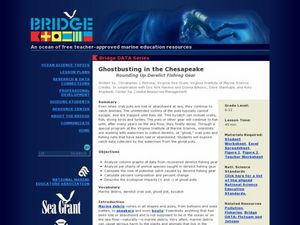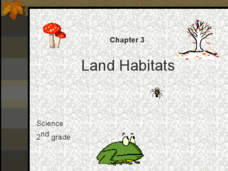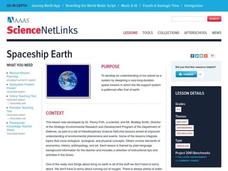Curated OER
Ghostbusting in the Chesapeake
Ghost pots, fishing gear lost during crabbing expeditions, continue to trap crabs that are never collected. Increase your budding ecologists' awareness of human impact on the environment as well as conservation efforts using this...
Curated OER
Changing Planet: Permafrost Gas Leak
Pair earth scientists up to use an amazing online arctic portal mapping tool and Google Earth to analyze permafrost changes. They compare changes to data on atmospheric concentrations of methane to see if there is a correlation. Then...
Curated OER
Let's Make a Compost Cake
Students create a compost cake. In this gardening and decomposition science instructional activity, students review and describe the "nutrient cycle." Students create a compost pile, measure and record the dimensions and temperature of...
Curated OER
Butterfly Life Cycle
Students investigate the life cycle of a butterfly. In this life cycle instructional activity, students read the book Monarch Butterfly by Gail Gibbons and discuss the four stages of the life cycle. Students illustrate the life cycle on...
Teach Engineering
The Great Pacific Garbage Patch
The Great Pacific Garbage Patch is one of several garbage patches around the world where garbage accumulates naturally. As part of a GIS unit that combines oceanography, environmental science, and life science, class members investigate...
Kenan Fellows
Sustainability: Learning for a Lifetime – The Importance of Water
Water is essential for life—and understanding the importance of clean drinking water is essential in understanding sustainability! Show your environmental science class the basics of water testing and treatment through a week-long...
Howard Hughes Medical Institute
Lesson 2: Gorongosa National Park
How has Gorongosa National Park changed over time? Discover the park's rich history, dating back to primitive human times, through an interactive timeline and scientific reading. The second installment in an eight-part series explores...
Curated OER
Lake Strata and Internal Waves
Use the classic density demonstration of placing a cola, a clear soda, and a diet soda into a tank of water. Then let learners attempt to pour some of the soda into layers in a clear container. The procedure explains a thermocline, and...
Wild BC
Carbon Sinks and Sources
Earth or environmental science pupils are assigned to be carbon sources or sinks. They ask yes-or-no questions to try to figure out which one they are. Then they discuss ways people can have positive effects on the changing climate by...
National Wildlife Federation
Life in the Cold: Climate Challenges
What does it take to make it in the Arctic? Learners examine the cold weather adaptations of a polar bear that help it survive. With everyday objects, they model these characteristics as they become make-shift polar bears. Modeling helps...
Curated OER
Quality of Life Investigations: Risk Reductions
Students participate in a discussion of recent environmental issues affecting their own community or ones nearby. In groups, they research the role of food additives and the purpose of adding them to foods. They also determine their...
Curated OER
How would an oil spill affect a Marine Sanctuary?
Students explore the concept of environmental stewardship. In this science lesson, students discover how scientists assess damages to the environment following oil spills. Students conduct a simulation of a public meeting in order to...
Curated OER
Marine Biology Field Trips
Students visit a Marine Biology study area 2-3 times and write a report after the last visit. They participate in the Marine Biology field trips working with lab partners. They complete data sheets to write their primitive environmental...
Curated OER
Marine Life Research and Persuasive Conservation Pamphlet
Tenth graders examine conservation and research a type of fish that is under environmental stress. For this conservation lesson students create a pamphlet about the conservation of a marine organism.
Curated OER
Marine Life Protected Areas in the O.C.
Students research a Marine Protected Area and determine the species' that benefit from its protection. In this marine lesson students present their findings to the class using PowerPoint.
Curated OER
Types of Marine Debris
Students conduct an experiment. In this marine debris and environment protection lesson, students categorize trash into piles, predict whether these trash items will sink, float or be picked up and carried by the wind and then test...
US Environmental Protection Agency
Carbon Through the Seasons
Meteorologists view an animated video by the Environmental Protection Agency to learn how the carbon cycle works, and then move into groups to analyze and graph actual data of the atmospheric carbon dioxide concentration from Hawaii's...
Curated OER
Lesson Plan: Humans and the Land
Art acts as inspiration for a conversation about human impact on the environment and creative writing. The class examines three pieces, looking for evidence of human impact on the landscape. They then write a first-person narrative, from...
NOAA
What's the Big Deal?
Who knew that a possible answer to Earth's energy resource problems was lurking deep beneath the ocean's surface? Part four of a six-part series introduces Earth Science pupils to methane hydrate, a waste product of methanogens. After...
Curated OER
Regents High School Examination: Living Environment 2009
Emerging ecologists need a full understanding of life, from the inner workings of a cell to the complex relationships among organisms. This examination is meant to assess high schoolers after an entire year course on the living...
Curated OER
Sugar Bush Sap Production - Human Environmental Impact on Sap Sand
Eleventh graders compare the amount of sugar sand present in tree sap. In this environmental science lesson, 11th graders measure different tree circumference. They prepare a report and share findings in class.
Curated OER
Land Habitats: Grade 3 Science
Build your students scientific vocabulary with this slide show on land habitats. Each slide provides a vocabulary word, image, and definition of a term common to habitats and the environment. Great for science class or as comprehensible...
Curated OER
Spaceship Earth
Middle schoolers develop an understanding of our planet as a system by designing a very-long-duration space mission in which the life-support system is patterned after that of earth.
National Park Service
Reduce Our Carbon Footprint, Let’s Compost!
Roll up your sleeves and get a little dirty with this elementary and middle school compost lesson plan. All you need is a large plastic container, a couple old newspapers, some organic waste, and a few hundred worms and you're ready...























